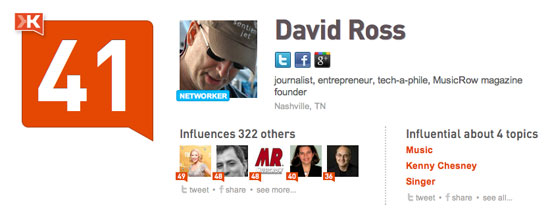
 If you are a frequent social networker, chances are you already know your Klout score which is measured on a scale of 1-100. The average score is 20, says the ratings site. New York Post writer Garett Sloane opines, “Having a higher Klout score than a rival is the latest form of business one-upmanship.”
If you are a frequent social networker, chances are you already know your Klout score which is measured on a scale of 1-100. The average score is 20, says the ratings site. New York Post writer Garett Sloane opines, “Having a higher Klout score than a rival is the latest form of business one-upmanship.”
Now about 2 years old, Klout monitors your Twitter, Facebook, Google Plus and other social networking accounts to see what kinds of reactions you get and how often people are engaged by what you are posting. “Adding more networks…can only increase your score,” claims the site’s online information which also explains, “Klout measures influence online using data from your social networks. Anywhere you have an online presence, you have the opportunity to influence people by creating or sharing content that inspires actions such as likes, retweets, comments and more. The more engagement your posts receive, the more influential you are. Klout uses this information to provide you a Klout Score that measures your overall influence.” Joe Fernandez, Klout CEO/Founder told the Post, “Ultimately, we look at things like how far does your message spread, what proportion of content you create gets acted upon and how influential are the people acting on your message.”
 Recently Klout altered its methodology which resulted in the lowering of many individual scores and understandably upset many of those who were downgraded. Expected to soothe the ruffled feathers is a deeper, more transparent look from the company into exactly how the scores are created and tabulated slated to arrive in mid-January 2012.
Recently Klout altered its methodology which resulted in the lowering of many individual scores and understandably upset many of those who were downgraded. Expected to soothe the ruffled feathers is a deeper, more transparent look from the company into exactly how the scores are created and tabulated slated to arrive in mid-January 2012.
TechCrunch contributor Semil Shah noted in a Klout editorial, “It’s worth remembering that Klout only claims to measure one’s online influence, and I tend to think that much of the backlash against the company is rooted in the misconception that one’s Klout score maps to the offline world. It’s easy to grandstand and take a publicly moral stance against what Klout is doing, but as it is with entrepreneurship and certainly the web, there are no rules. Companies and users are making the rules as they go, and that’s just the way it should be.”
Mashable’s Samantha Murphy playfully suggests that those with higher scores tend to be the ones most satisfied with the methodology. “It seems as though it’s those with lower Klout scores that detest the concept, while members with higher scores are reaping the benefits of the platform. Some have even gotten job offers, free products and gift certificates from companies that want to keep the Klout influencers on their radar,” she says. “Obtaining a high Klout score is becoming more of something to strive for, with some even highlighting their number on resumes.” Murphy has created a 7-point list of how to get more Klout. “Build a network and create meaningful content,” she advises. “If you keep focused on your network strategy and your content strategy, you’ll succeed.” (See her complete list here.)
Klout scores describe a very limited aspect of a person’s personality and/or lifestyle. However, it seems that marketers are beginning to realize that enlisting social networkers with high scores who broadcast their messages to a large audience can be extremely influential in promoting a brand or a product such as music.

Category: Featured, Sales/Marketing
About the Author
Journalist, entrepreneur, tech-a-phile, MusicRow magazine founder, lives in Nashville, TN. Twitter him @davidmross or read his non-music industry musings at Secrets Of The ListView Author Profile


